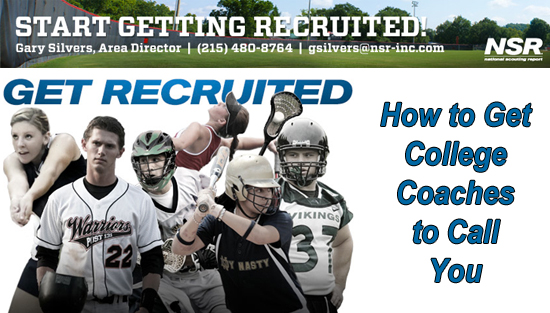- Log in to post comments
 The following article is sponsored by National Scouting Report. Visit NSR’s web site at nsr-inc.com
The following article is sponsored by National Scouting Report. Visit NSR’s web site at nsr-inc.com
RECRUITING BLOG: HOW TO GET COLLEGES COACHES TO CALL YOU
By Gary Silvers
We are one week into the contact period for NCAA Division I football coaches, who are permitted to make one telephone call to each 2016 prospect through May 31.
Did you answer the call?
Did you get any calls?
 High school prospects in most sports can receive unlimited calls from Division I coaches beginning September of their junior year. Prospects in baseball, cross country, lacrosse, softball, swimming and diving, track and volleyball can receive unlimited calls beginning July after their junior year. Division I football coaches can call prospects once a week beginning September of their senior year.
High school prospects in most sports can receive unlimited calls from Division I coaches beginning September of their junior year. Prospects in baseball, cross country, lacrosse, softball, swimming and diving, track and volleyball can receive unlimited calls beginning July after their junior year. Division I football coaches can call prospects once a week beginning September of their senior year.
Prospects can receive unlimited calls from Division II coaches beginning June 15 before their junior year. Division III coaches, who can’t offer athletic scholarships, can call prospects anytime.
If you are NOT receiving calls, you are NOT being recruited.
Sorry to disappoint you, but emails and questionnaires from college coaches come a dime a dozen. They are standard operating procedure.
Calls, on the other hand, can be worth their weight in gold. That’s when you know college coaches have a genuine interest in you. The more calls you receive from coaches, the more interested they are.
Calls often lead to off-campus contact, official college visits and verbal offers. Those lead to verbal commitments and the official signing of the National Letter of Intent.
 What should you do if you’re not receiving calls?
What should you do if you’re not receiving calls?
Call the coaches.
That’s right, look up their phone numbers, pick up the phone and call. While coaches may have calling restrictions, you can call them at any time. I suggest you start doing it in your sophomore year. The longer you wait, the fewer offers will remain.
If you are fortunate enough to contact a coach by phone, introduce yourself to the coach, let them know you are interested in playing for their team and tell them you would like to email them information.
If you get a voicemail, simply leave your name and phone number, tell them you are interested and plan to email them information. That shows the coach some initiative, which increases the chances that the coach will respond.
Oftentimes, you will receive a response from an assistant coach. The head coach may not have time to make contact with every prospect, especially early in the recruiting process. That will change if the head coach has mutual interest.
Keep your emails to coaches short -- no longer than 3-4 paragraphs. They should contain an introduction, why you are interested in playing for their team and a link to your video. You should attach an academic-athletic resume to the email that contains contact information, academic and athletic information and personal references.
If a coach responds, be sure to respond in the same way -- calls, texts or emails. Regular communication is key. If you don’t respond, a coach will lose interest.
I recommend a call, text or email to a coach every few months for freshmen and sophomores and at least once a month for juniors and seniors.
If a coach doesn’t respond, keep trying. If repeated attempts fail, cross that school off your list. Your goal is to create competition among interested coaches and, ultimately, narrow your list to the schools you’re interested in most.
